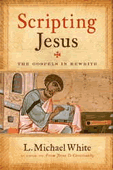When we left Jesus at the end of chapter 4, he had built up quite a following. “Great multitudes” came from all over to be healed and to hear his teachings. Seeing the huge throng, he climbed a mountain, sat down and delivered his Sermon on the Mount, which covers chapters 5-7 and consists, with the exception of the first two verses of chapter 5 and the last two verses of chapter 7, entirely of Jesus speaking. [Aside: reading the Sermon on the Mount in What He Said makes His message really pop off the page].
Chapter 5
The sermon begins with the Beatitudes, a series of eight blessings to the poor in spirit, to those who mourn, to the gentle, to those who hunger and thirst after righteousness, to the merciful, to the pure in heart, to the peacemakers, and to those who have been persecuted for righteousness’ sake. They are beautiful, powerful words which is why we based our cover design on them. The rest of chapter 5 contains some of the best known quotes from Jesus:
- 5:13 – “You are the salt of the earth…”
- 5:14 – “You are the light of the world…”
- 5:28 – contains the gotcha that got Jimmy Carter.
- 5:39 – turn the other cheek.
- 5:42 – “Give to him who asks you, and don’t turn away him who desires to borrow from you.”
- 5:44 – “…love your enemies…do good to those who hate you…”
Chapter 6
The sermon continues uninterrupted right into chapter 6. Some of my highlights include:
- 6:2 – “…when you do merciful deeds, don’t sound a trumpet before yourself…”
- 6:9-13 – The Lord’s Prayer
- 6:19 – “Don’t lay up treasures for yourselves on the earth, where moth and rust consume…” (and that fill up the attic and clutter the whole house, as I tell my wife).
- 6:27 – “Which of you, by being anxious, can add one moment to his lifespan?” (I think we could all benefit from a colossal calming down).
Chapter 7
- 7:1 – “Don’t judge, so that you won’t be judged.”
- 7:3 – “Why do you see the speck in your brother’s eye, but don’t consider the beam that is in your own eye?”
- 7:7 – “Seek, and you will find.”
- 7:15 – “Beware of false prophets, who come to you in sheep’s clothing, but inwardly are ravening wolves.”
The crowd was dumbfounded “for he taught them with authority, and not like the scribes.”
Chapter 8
After the sermon, Jesus hits the road again and heals a great many people in succession (a leper, a centurion’s servant, Peter’s wife’s mother, many possessed with demons). After so much healing, He’s tired and declares “the Son of Man has nowhere to lay his head.” A disciple wants to help Him, but asks if he can first go bury his father. To which Jesus (somewhat harshly considering 5:4?) says, “Follow me, and leave the dead to bury their own dead.”
Jesus and the disciples get into a boat which soon finds itself in the middle of a huge storm. The disciples are all freaking out and wake up Jesus, pleading with Him to save them. You can almost hear the annoyance in Jesus’ voice as He gives his “O you of little faith” line and then calmly gets up and ends the storm.
Chapter 8 concludes with Jesus confronting two people possessed by demons in Gergesenes. The demons beg to be cast out into a herd of pigs which Jesus makes happen. Whereupon the whole herd of pigs rushes off a cliff and dies in the water. The owners of the pigs took off and told everyone in the city what had happened.
Soon, the whole city comes out to meet Jesus.
Next week: Matthew, Chapters 9-12



Join What He Said Online